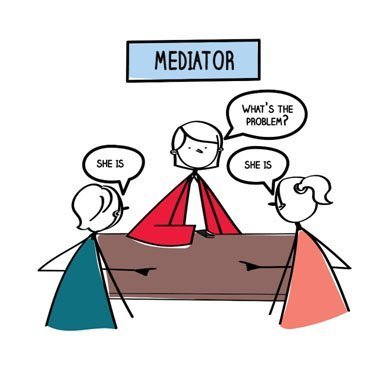In today’s hasty economic world, the forte of every organization depends upon its economy, growth, productivity, continuity. All these factors are determined by the employee’s personal and professional capabilities. An employee is as important for an organization as a beam for a building. In an organization hundreds to thousands of employees share the same workplace having different skills, qualifications, backgrounds and opinions which could possibly transform to conflicts.
This gesture is pretty sane because conflicts are natural to the human being. Here arises a state where coaching and mediation are obliged. In this article, you will get to grasp how mediation, coaching impressions, the competence and productivity of employees contribute to up rise an organization. They need harmony to work together in order to achieve organizational goals.

Scientific evidence for the effectiveness of coaching & mediation
Evidence shows that successful organizations spend thousands of dollars on their employee’s coaching and mediations. It is a kind of an investment, an input-output method to bring lead and success all their way. Since administrative coaching has been proved to be very powerful, this article will explain the factors that shape coaching upshots from the viewpoint of both the coach and coachee. It will also manifest the mediating effects on the working fusion of coachee.
Whereas, Mediation is a new process and has a 70% success rate where ever it has been used. In mediation, a third party is involved to resolve conflicts.

Effective psychological outcomes of Mediation:
These are key some of the benefits of mediation
1. Self-confidence
Coaching and mediation have an important impact on strengthening self-confidence of employees. It enhances self-esteem in particular.
2. Self-Efficacy
Mediation has a positive psychological impact. It develops self-efficacy and the employee’s capabilities whereas coaching highlights their abilities to perform in better ways. They develop self-confidence and eventually it increases their productivity. Positive coaching will lead them to take more personal responsibility.
3. Locus of control
Some organizations have poor restructuring and instabilities of the internal environment. This is because their employees don’t have control over their behaviors. They might have a feeling of helplessness. Mediation will improve their instability and organizational streamline.
4. Communication
Mediation and coaching improve an individual’s level of interaction and communication. Sometimes conflicts may occur only because of a lack of communication. Mediation enables employees to communicate well in order to avoid misunderstandings.
5. Attitude
As a negative attitude is not acceptable in any setting, the latter is a very crucial prospect. A positive attitude is an outcome of mediation and coaching. Through proper coaching, the coach will bring out the positive attitudes of employees to resolve all conflicts.
6. Trust
The strength of an organization relies on the level of trust among individuals sharing the same workplace. If they do have a trustworthy relation they work efficiently, discussions will be made without any restrictions and the outcome will be awesome. Mediators build up trust levels of employees.

Psychology is a basic tool for all mediators in respect to influence decisions of other individuals. Their observations and hypothesis offer expedient tools for professionals. They can use these gears for business negotiations, scales, and stimuli. With the help of psychological tactics and trappings, mediators guide parties and professionals to achieve strength, clarity of thoughts, the power of negotiation and self-confidence.
Sometimes while coaching, a barrier of consistency occurs. It is difficult for mediators to alter ideas and concepts of professionals or individuals they are dealing with. Parties often become litigant about their decisions.
Today’s mediators have changed their way of doing. They have learned the art of slight negotiation known as “interest-based- negotiation”. It provides a way to find common ground between both parties (mediator and individual).
It is a fact that successful mediation requires sensitive psychological dynamics to understand people’s needs, thoughts, feelings and behaviors.
In short, it is obvious that if someone understands mediations, he will perform better and get maximum benefits. Eventually, organizations get more than expectations.
References:
https://www.mediate.com/articles/WinestoneJ1.cfm
https://www.research.manchester.ac.uk/portal/files/54508928/FULL_TEXT.PDF
https://msed.vse.cz/msed_2016/article/91-Lankasova-Radka-paper.pdf

